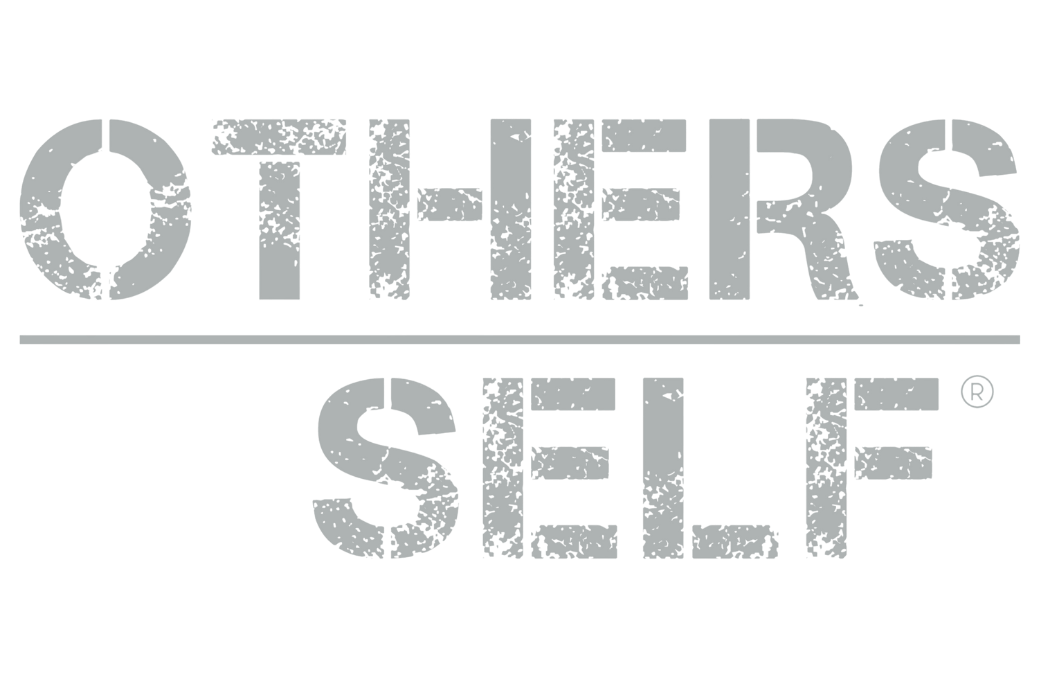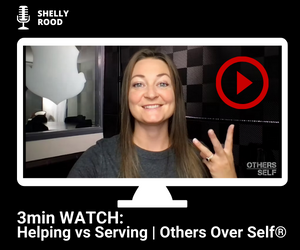Take your conversation skills to the next level by navigating topics like a pro when conversing with military people. Short attention span? Here’s a tip from article contributor Doug Slocum, Brigadier General (retired): You can’t go wrong with asking someone about their family or pets.
As military people can attest, we’ve all been there: grabbing a bite to eat at a local restaurant (either in uniform or wearing Veteran gear) and our meal is interrupted when a stranger, let’s call her Martha, approaches the table.
Martha means well, and everyone knows this. Yet, when her five minute, “Let me tell you why I didn’t join the military,” story transitions into ten more minutes about her uncle’s service record, it’s hard to remain polite. After all, no one likes soggy fries, Martha… no one.
Being self-focused is a sure way to lose credibility when conversing with a military person.

The problem with this scenario is that while Martha is setting out to recognize others for their military service, she is unintentionally utilizing the interaction to talk about herself. This is just one example of issues that arise when we engage military people in social conversation (defining “military people” as service members, veterans and military families). When these situations occur, we are missing opportunities for meaningful connections.
Today’s lesson comes from our 21-page article titled “4 Ways to Make A Meaningful Connection With Military People,” which you can download for free HERE. Also, be sure to read Part 2 of this series, “Connecting With Military People: 4 Ways to be Confident.“
Originally written to assist people of faith in having these conversations, these words can benefit all of us through their dual purpose of: 1) helping you craft your message, and 2) furthering our mission of eliminating the negative stigma around military service.
These resources are being made available to you through our Warriors With Warriors Program: Connecting Spiritual Warriors with Earthly Warriors (more HERE). Funding Disclaimer: The Michigan Department of Health and Human Services, through the Community Mental Health Association of Michigan, has provided funding for this initiative through a Federal Community Mental Health Block Grant and a Substance Abuse Prevention and Treatment Block Grant.
Why You Should Make the Effort to Converse With Military People
Sharing a conversation with a person connected to the military is a unique experience- and one that can also bring unintentional harm. While others shout, “Thank you for your service!” across a crowded room, the wise conversationalists in 2022 realize the power of tapping into carefully crafted, privately spoken words. In a two-minute interaction, you have the opportunity to make a meaningful difference in the lives of our nation’s heroes.

Studies show a genuine disconnect between military and civilian populations – and this is true even within immediate families of service members. Add to that the negative statistics surrounding military mental wellness and suicide rates (high, very high… more to follow), and we, the Authors, felt compelled to produce this article in order to help you to be able to plant seeds of love.
Don’t Assume Someone Else is Doing the Hard Work
Did you know that under current policy, only about 60 percent of U.S. veterans are eligible for VA care, based on length of service, service-connected injuries, service in designated combat theaters, and income? Furthermore, fewer than half of eligible veterans use VA health benefits (source: RAND). This means that a lot of the military needs kind words and a genuine moments of connection with… you.
Getting Real About Military and Veteran Suicide
Every day, 22 Veterans are dying by suicide, and that statistic is only getting worse in today’s global climate. Even more heartbreaking is the fact that the number has seen little to no change in previous years.
Suicide is preventable
Dr. Matt Miller, director of the VA Suicide Prevention Program
In 2019, the rate dropped to 17 per day (the lowest in 12 years), but it is back up and suicide remains a significantly higher threat for veterans than for the rest of the U.S. public (source: Military Times). Have hope, for the director of the VA Suicide Prevention Program is saying that, “Suicide is preventable.”
To Say Something or Not
Fact: We need you!
Most people who are choosing to engage a military person in direct conversation are doing so out of the goodness of our hearts. True, there are some out there that purposefully use these interactions to incite chaos and make political statements, but those people aren’t the ones taking the time to read this article (right?).
Even though it may feel awkward, we are encouraging you to break the silence and show honest interest in the service member in your presence. By doing so, you are contributing to their mental wellness by providing healthy social interaction, a known factor in decreasing suicide rates.
The Big 3 Issues When Conversing With Military People
If you want to have a conversation with someone who agrees with you on everything, talk to a mirror.
Perhaps it’s the uniform or the general representation of “our” country, but oftentimes we assume that a military person shares our opinions or values- and that’s just not the case.
During a quick conversation with a stranger, the exchange of words can result in a negative experience for one or both parties. This occurs when opposite beliefs are uncovered and time does not allow for either a progressive discussion to take place or for the creation of a relationship. This matters because the resulting negative interaction is the opposite of why you’re striking up a conversation in the first place.
Issue #1: Pushing a Political Agenda
Our experience is that politics equals immediate division.
How was your Thanksgiving this year?
Family gatherings are known for being a hotbed of disagreement and the same is true with any gathering of people. In his book, “Moral Choices: An Introduction to Ethics,” author Scott B. Rae details 11 areas of ethical importance that each person should carefully consider and weigh their personal values against. War, violence, gun control and self defense are just a few of these.
Active service members don’t have the same rights as civilians to freedom of speech.
While there is a perceived national value of the military as being one of the few remaining apolitical institutions in America, this value is fading according to a report in the Military Times.
The report also says that more than three-fourths of troops believe the military has become more politically polarized in recent years and that there are concerns that the military may be drawn into partisan fights.
Furthermore, service members don’t have the same rights as civilians to freedom of speech. There are rules on political activity and protests for active-duty troops, and here are a few examples: barred from attending certain gatherings, posting campaign signs, holding a leadership role in a political party and more.
The lessons about talking politics with military people are:
- Don’t assume that we agree with you on values or political ideals
- We signed up to defend the country regardless of who is voted in
- Most military people may choose to be apolitical when confronted

Issue #2: Forcing Religious Viewpoints
Our experience is that freedom of religion is highly valued.
The modern military includes over 100 religious preferences, so there’s a good chance that the service member, veteran or loved one in front of you prescribes to a different belief system. A quick moment, first time interaction is not the place to launch into a conversion attempt.
Consider this: at least once each year, our service members are required to report religious preference. This inalienable right is noted in our personnel files, stamped on the dog tags hanging around our necks, and held in reverence through the Chaplain Corp.
On the whole, we know that religion is a thing. If we, as individuals, are searching for spiritual growth, it is more likely that we will remember how you made us feel versus what you said.
Internal thoughts like, “Don’t pray for me because there is no God,” are not uncommon.
Also, consider that upholding the freedom of religion is a matter of national significance. At any given time, legal action is being taken against the armed forces for perceptions of religious discrimination by various religions. These issues may also arise with respect to granting religious accommodations for apparel, practice, and personal grooming.
So, while statements like, “I’ll be praying for you,” may feel good to say, they may actually trigger a variety of issues for the service member. Internal thoughts like, Tell that to someone else, Which God will you be praying to?, and, Don’t pray for me because there is no God, are not uncommon. The service member may be too polite to share their valid feelings aloud.
The point here is that you might walk away feeling better, but will they?
Now, there are times when conversational moments around spirituality are a natural fit. They may also be paramount to your personal beliefs. In these cases, try addressing the topic of spirituality by first asking questions.
This technique is a transfer of conversational power and helps the recipient to feel involved in the conversation instead of being “talked at.”
Good examples of bringing up spirituality:
- “I would like to respectfully support you- what religious beliefs do you hold?”
- “Would it be alright if I prayed for you?”
- “Freedom of religion is important to me- thank you for supporting it. How can I support your rights as well?”

Issue #3: Focusing on Yourself
And, we’re back to Martha. Our experience is that private, 2-way interactions always win.
Military people have all been there- trapped in uniform in a public place. We feel awkward, uncomfortable, and generally would rather be anywhere else, but the baby needs milk so here we are- standing in the checkout line of the local grocery store at rush hour. Or, grabbing lunch with a few colleagues during the duty day at the closest family restaurant.
Wherever it is, it is almost inevitable that someone will approach us and recite the standard, “Thank you for your service,” (TYFYS) line, and then launch into a ten-minute monologue about their father-grandfather-aunt-niece… neighbor- whoever, that also served.
Or, they’ll spot the camouflage and shout out, “TYFYS,” from three aisles away, making sure everyone in a ten mile radius knows they said it.
On the whole, these interactions are not occuring with malicious intent, yet there is so much more that could be happening. Never forget that on any given day, American service members like us are facing potential public shaming such as being spit on, yelled at or even kicked for wearing the uniform.
Here’s the thing: we WANT you to say TYFYS, and if your heart is genuine, please don’t stop there. If you really want to serve the service member, work on shifting the conversation to them.
And we’re here to help you do just that.
One more note on the issue of “focusing on yourself,”- gender plays a part in our personal comfort level during social communication. Be aware that some of us prefer like-gender conversations, and some are the opposite.

So, there you have it. If you’ve read this, you are undoubtedly smarter as to how to make a meaningful connection with military people. You’ve learned the best strategies, tips and practices, and even seen examples that we have learned during our collective time in service. Here’s a quick recap:
Conversing With Military People: 3 Issues to Watch For
- Pushing a political agenda
- Forcing religious viewpoints
- Focusing on yourself
Still, this knowledge will not yield results…
The EXECUTION of this knowledge is guaranteed to make a difference. Pick a few things and start today. Share this with your family and friends, your coworkers and even with the military people you already know – we would love to hear their take on it.
Be sure to read Part 2 of this series, “Connecting With Military People: 4 Ways to be Confident.“
Click HERE for the full 21-page article and to read bios of the four authors: Chaplain Brian Webb, Chaplain Shelly Rood, Brigadier General Doug Slocum (retired) and Licensed Master Social Worker Diana Laskey (all military veterans).






